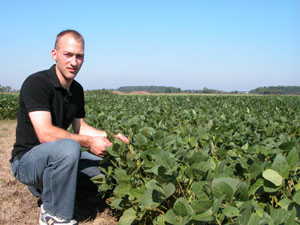By Shelley Grieshop
sgrieshop@dailystandard.com VERSAILLES -- At 23, Joe Grilliot has many options in life.

A philosophy major, this country boy with a quick smile could fill any number of positions in the job market. But his heart is currently leading him toward just one -- a career serving the Lord.
"I really enjoy meeting new people and talking about faith with them," says the former high school football player and cross country runner, a graduate of Versailles High School and the University of Toledo.
Grilliot, the son of John and Louise Grilliot, decided to become a seminarian with the Missionaries of the Precious Blood after feeling called to serve God during his freshman year in college. With his youthfulness comes a fairly progressive perspective on controversial issues within the church.
Recent studies by the Center for Applied Research in Apostolate Study (CARA) show there are a growing number of Catholic priests who want to restore the pre-Vatican II church, in direct opposition to the more liberal church leaders of the '60s and '70s. Allowing priests to wed and women to become ordained are hot topics today for both liberal and conservative church leaders. The freedom to voice all opinions is important within the church, Grilliot says.
"I believe that dialogue is an important part of the discernment and growing process of faithful people and to condemn that dialogue severely stunts the life of the people of God," he says.
As far as women becoming priests, he says:
"One of the biggest practical roadblocks against women being permitted to enter the priesthood are the many cultures throughout the world where females hold unpublic and non-leadership roles, which is far different than in the U.S."
The transition would be slow if at all, he believes.
Grilliot thinks priests would be allowed to marry before women are ever given the OK to become priests.
He is about 95 percent sure that priesthood is his destiny. But that hasn't stopped him from wondering about other options.
"I have contemplated what it would be like to be married. I could see myself married with a wife and kids," says Grilliot. "But that picture just doesn't seem to fit as well with who I am as much as priesthood does."
Several of his classmates have tied the matrimonial knot. With a shy grin, he recalls dating a little in high school, but says he felt like back then he didn't have the maturity needed for relationships.
"Even in college with better relationship skills, I didn't quite feel comfortable in a dating relationship. It just wasn't the best thing for me," he says.
Back in the '50s and '60s, young men and women flocked to become priests, brothers and sisters. One in every 10 young adult Catholic men who graduated from college was studying theology to become a priest in 1950, according to CARA.
But by 2002, theology school enrollment had dropped 60 percent. Now, less than 27 percent of U.S. Catholic parishes have a resident priest. Locally, parishes are being clustered and many times two priests juggle up to five parishes.
Many people say the priest shortage has a lot to do with the sex abuse charges filed in the last decade against priests. Church leaders say that's not so. The lack of young men entering the priesthood has been a trend for many years, they say, and is directly related to a society that places greater value on material items than spirituality.
Grilliot openly discusses the issues he may face and "the dirty looks he may get," as a result of the scandals that have rocked the church. He is quick to point out that less than 3 percent of all priests have been accused of deviant sexual behavior with minors.
"Probably less than most help professionals like teachers, counselors, doctors and nurses," he adds.
Many of the abuse cases made public today occurred 10 to 20 years ago, he also adds.
"It's possible some of these abuses are happening today, but the chances are much lower," because of changes in areas such as church policies and formation requirements, he says.
The abuse disgusts him but actually makes him more determined, he says. "It makes me want to do better. We need good priests."
Today, anyone entering the priesthood must take a psycho-sexual development test that identifies deviancy, mental problems and sexual issues, Grilliot says.
He spent nine months at Gaspar House in Dayton in initial formation before continuing spiritual training that has taken him as far as California. He has learned about community and how Precious Blood members serve as missionaries in many different capacities.
Next month he begins a nine-month internship at Saint James the Less in northeast Columbus. In all, it will likely be another five years of training and internships before he is ordained.
The Rev. Ken Schnipke, a director of vocations for the Precious Blood Society, says Grilliot has a passionate heart.
"He comes from solid roots and loves to be around people," Schnipke says of the Darke County native. "That's one of the things that has drawn him to us. We're not lone rangers here."
Helping others in some capacity is Grilliot's ultimate goal, he says.
"Many people have plenty of resources and support and others have very little," he says. "God calls us to help those on the outskirts of society, to share our resources with them, to love and minister to them." |

